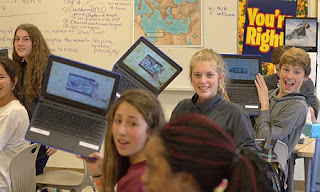As a lover of photography and somewhat of a technology "geek," I spend a lot of time with digital information. My photographs are stored on my computer (and backed up on an external hard drive) and my communication is in email, texts, and Facebook messages. My calendar is linked to my Google account and my cell phone. It is all so convenient and available at my fingertips. But... will my grandson be able to see those digital photos, or will his computing device not read my .jpg files? My mother has old letters that were written by her uncle during World War I. Will anyone be able to look back at emails that today's soldiers send home to get a taste of the conflict in the Middle East?
Some years back on April Fool's Day, Google posted a new product:
Gmail Paper, a service allowing customers to archive emails to paper and have them sent to them at their homes. A joke, yes, but it does cause one to ponder. Once your email provider goes out of business, what happens to all of those missives you sent to your child at college or your mother who was away taking care of her own mother?
 |
This is my great-grandmother Pearl and me,
a photo captured on film and printed
on real paper (then scanned for this blog!) |
Recently I began going through my digital photographs and printing out the ones I like the most, the ones that tell the story of my life in the years since I put down the film camera and picked up the digital one. My daughter creates a hard cover book using her digital images every year. She fills it with the memories of that year in a way that will not disappear. Even 100 years from now, her great-great-grandchildren will be able to pick up that book to see what life was like in 2015.
A
recent presentation by Vint Cerf, vice-president of Google, at the American Association for the Advancement of Science’s annual meeting in San Jose, California, highlighted the possibility that, "piles of digitized material – from blogs, tweets, pictures and videos, to official documents such as court rulings and emails – may be lost forever because the programs needed to view them will become defunct." Cerf calls this "bit rot." Scientists are working to figure out ways to be sure that we do not lose vital pieces of history to the obsolescence of the machines needed to read them. I find that fascinating! So, go ahead and print out those photos, make books, store some valuable writings on real paper. Let's not lose our legacy to bit rot.
I highly recommend reading the article about Vint Cerf's
presentation. It is well worth the time.










